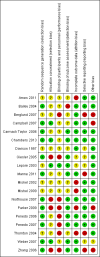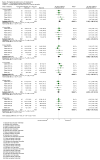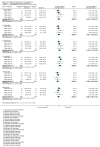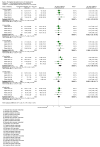Psychosocial interventions for men with prostate cancer
- PMID: 24368598
- PMCID: PMC11942044
- DOI: 10.1002/14651858.CD008529.pub3
Psychosocial interventions for men with prostate cancer
Abstract
Background: As the incidence and prevalence of prostate cancer continue to rise, the number of men needing help and support to assist them in coping with disease and treatment-related symptoms and their psychosocial effects is likely to increase.
Objectives: To evaluate the effectiveness of psychosocial interventions for men with prostate cancer in improving quality of life (QoL), self-efficacy and knowledge and in reducing distress, uncertainty and depression.
Search methods: We searched for trials using a range of electronic databases including the Cochrane Central Register of Controlled Trials (CENTRAL), MEDLINE, EMBASE and PsycINFO to October 2013, together with handsearching of journals and reference lists.
Selection criteria: Randomised controlled trials of psychosocial interventions for men at any stage of prostate cancer. We included psychosocial interventions that explicitly used one or a combination of the following approaches: cognitive behavioural, psychoeducational, supportive and counselling. Interventions had to be delivered or facilitated by trained or lay personnel.
Data collection and analysis: Pairs of review authors independently extracted data and assessed risk of bias. We analysed data using standardised mean differences (SMDs), random-effects models and 95% confidence intervals (CIs).
Main results: Nineteen studies comparing psychosocial interventions versus usual care in a total of 3204 men with prostate cancer were included in this review. All but three of these studies were conducted in the United States.Men in the psychosocial intervention group had a small, statistically significant improvement in the physical component of general health-related quality of life (GHQoL) at end of intervention (1414 participants, SMD 0.12, 95% CI 0.01 to 0.22) based on low-quality evidence. A small improvement in favour of psychosocial interventions (SMD 0.24, 95% CI 0.02 to 0.47) was also seen in the physical component of GHQoL at end of intervention for group-based interventions. No clear evidence of benefit was found for GHQoL scores at end of intervention with individual-based interventions compared with controls. Also, no clear evidence suggested that psychosocial interventions were beneficial in improving the physical component of GHQoL at four to six and at eight to 12 months post-intervention. In addition, no clear evidence showed benefit associated with psychosocial interventions for the mental component of GHQoL at end of intervention (1416 participants, SMD -0.04, 95% CI -0.15 to 0.06) based on moderate-quality evidence. Results for the mental component of GHQoL at four to six and at eight to 12 months post-intervention were compatible with benefit and harm. At end of intervention, cancer-related QoL showed a small improvement following psychosocial interventions (SMD 0.21, 95% CI 0.04 to 0.39), but at eight and 12 months, the effect was compatible with benefit and harm. For prostate cancer-specific and symptom-related QoL, the differences between groups were not significant.No clear evidence indicated that psychosocial interventions were beneficial in improving self-efficacy at end of intervention (337 participants, SMD 0.16, 95% CI -0.05 to 0.38) based on very low-quality evidence in three studies that assessed individual-based interventions. The results for self-efficacy at six to eight and at 12 months post-intervention were compatible with benefit and harm. Men in the psychosocial intervention group had a moderate increase in prostate cancer knowledge at end of intervention (506 participants, SMD 0.51, 95% CI 0.32 to 0.71) based on very low-quality evidence in two studies; this increase was also observed in the subgroups of group-based and individual-based interventions. A small increase in knowledge with psychosocial interventions was noted at three months post-intervention (SMD 0.31, 95% CI 0.04 to 0.58).The results for uncertainty (916 participants, SMD -0.05, 95% CI -0.35 to 0.26) and distress (916 participants, SMD 0.02, 95% CI -0.11 to 0.15) at end of intervention were compatible with both benefit and harm based on very low-quality evidence. No clear evidence suggests that psychosocial interventions were beneficial in reducing uncertainty and distress between groups at six to eight and at 12 months post-intervention. Finally, no clear evidence of benefit is associated with psychosocial interventions for depression at end of intervention (434 participants, SMD -0.18, 95% CI -0.51 to 0.15) based on very low-quality evidence. Individual-based interventions significantly reduced depression when compared with usual care groups. The results for depression at six and at 12 months post-intervention were compatible with benefit and harm.The overall risk of bias in the included studies was unclear or high, primarily as the result of performance bias.No data regarding stage of disease or treatment with androgen deprivation therapy (ADT) were extractable for subgroup analysis. Only one study addressed adverse effects. High attrition could indicate that some participants may not have been comfortable with the interventions.
Authors' conclusions: Overall, this review shows that psychosocial interventions may have small, short-term beneficial effects on certain domains of well-being, as measured by the physical component of GHQoL and cancer-related QoL when compared with usual care. Prostate cancer knowledge was also increased. However, this review failed to demonstrate a statistically significant effect on other domains such as symptom-related QoL, self-efficacy, uncertainty, distress or depression. Moreover, when beneficial effects were observed, it remained uncertain whether the magnitude of effect was large enough to be considered clinically important. The quality of evidence for most outcomes was rated as very low according to GRADE, reflecting study limitations, loss to follow-up, study heterogeneity and small sample sizes. We were unable to perform meaningful subgroup analyses based on disease stage or treatment modality. Although some findings of this review are encouraging, they do not provide sufficiently strong evidence to permit meaningful conclusions about the effects of these interventions in men with prostate cancer. Additional well-done and transparently reported research studies are necessary to establish the role of psychosocial interventions in men with prostate cancer.
Conflict of interest statement
KP and CS received a grant that included support for travel from the Health and Social Care Research and Development Office (Northern Ireland) as part of the Cochrane Training Fellowship Scheme. JN received travel support unrelated to the review from the National Institute for Social Care and Health Research (NISCHR) Steering Group Wales and The Cochrane Collaboration to attend meetings, and received support from grants unrelated to the review from the National Institute for Health Research (NIHR), the NISCHR, The Cochrane Collaboration and Together for Short Lives.
Figures
































Update of
References
References to studies included in this review
Ames 2011 {published data only}
-
- Ames SC, Tan WW, Ames GE, Stone RL, Rizzo Jr TD, Crook JE, et al. A pilot investigation of a multidisciplinary quality of life intervention for men with biochemical recurrence of prostate cancer. Psycho‐oncology 2011;20(4):435‐40. - PubMed
Bailey 2004 {published data only}
-
- Bailey DE, Mishel MH, Belyea M, Stewart JL, Mohler J. Uncertainty intervention for watchful waiting in prostate cancer. Cancer Nursing 2004;27(5):339‐46. - PubMed
Berglund 2007 {published and unpublished data}
-
- Berglund G, Petersson L‐M, Eriksson KC, Wallenius I, Roshanai A, Nordin KM, et al. “Between men”: a psychosocial rehabilitation programme for men with prostate cancer. Acta Oncologica 2007;46(1):83‐9. - PubMed
Campbell 2007 {published and unpublished data}
-
- Campbell LC, Keefe FJ, Scipio C, McKee DC, Edwards CL, Herman SH, et al. Facilitating research participation and improving quality of life for African American prostate cancer survivors and their intimate partners: a pilot study of telephone‐based coping skills training. Cancer 2007;109(Suppl 2):414‐24. - PubMed
Carmack Taylor 2006 {published data only}
-
- Carmack Taylor CL, Demoor C, Smith MA, Dunn AL, Basen‐Engquist K, Nielsen I, et al. Active for Life After Cancer: a randomized trial examining a lifestyle physical activity program for prostate cancer patients. Psycho‐oncology 2006;15(10):847‐62. - PubMed
Chambers 2013 {published and unpublished data}
-
- Chambers SK, Ferguson M, Gardiner RA, Aitken J, Occhipinti S. Intervening to improve psychological outcomes for men with prostate cancer. Psycho‐oncology 2013;22(5):1025‐34. - PubMed
Davison 1997 {published and unpublished data}
-
- Davison BJ, Degner LF. Empowerment of men newly diagnosed with prostate cancer. Cancer Nursing 1997;20(3):187‐96. - PubMed
Giesler 2005 {published data only}
-
- Giesler RB, Given B, Given CW, Rawl S, Monahan P, Burns D, et al. Improving the quality of life of patients with prostate carcinoma: a randomized trial testing the efficacy of a nurse‐driven intervention. Cancer 2005;104(4):752‐62. - PubMed
Lepore 2003 {published data only}
Manne 2011 {published and unpublished data}
Mishel 2002 {published and unpublished data}
-
- Mishel MH, Belyea M, Germino BB, Stewart JL, Bailey DE Jr, Robertson C, et al. Helping patients with localized prostate carcinoma manage uncertainty and treatment side effects: nurse‐delivered psychoeducational intervention over the telephone. Cancer 2002;94(6):1854‐66. - PubMed
Mishel 2009 {published and unpublished data}
-
- Mishel MH, Germino BB, Lin L, Pruthi RS, Wallen EM, Crandell J, et al. Managing uncertainty about treatment decision making in early stage prostate cancer: a randomized controlled trial. Patient Education and Counseling 2009;77(3):349‐59. - PubMed
Northouse 2007 {published and unpublished data}
-
- Northouse LL, Mood DW, Schafenacker A, Montie JE, Sandler HM, Forman JD, et al. Randomized clinical trial of a family intervention for prostate cancer patients and their spouses. Cancer 2007;110(12):2809‐18. - PubMed
Parker 2009 {published and unpublished data}
Penedo 2006 {published and unpublished data}
-
- Penedo FJ, Molton I, Dahn JR, Shen BJ, Kinsinger D, Traeger L, et al. A randomized clinical trial of group‐based cognitive‐behavioral stress management in localized prostate cancer: development of stress management skills improves quality of life and benefit finding. Annals of Behavioral Medicine 2006;31(3):261‐70. - PubMed
Penedo 2007 {published and unpublished data}
-
- Penedo FJ, Traeger L, Dahn J, Molton I, Gonzalez JS, Schneiderman N, et al. Cognitive behavioral stress management intervention improves quality of life in Spanish monolingual hispanic men treated for localized prostate cancer: results of a randomized controlled trial. International Journal of Behavioral Medicine 2007;14(3):164‐72. - PubMed
Thornton 2004 {published and unpublished data}
-
- Thornton AA, Perez MA, Meyerowitz BE. Patient and partner quality of life and psychosocial adjustment following radical prostatectomy. Journal of Clinical Psychology in Medical Settings 2004;11(1):15‐30.
Weber 2007 {published and unpublished data}
-
- Weber BA, Roberts BL, Yarandi H, Mills TL, Chumbler NR, Wajsman Z. The impact of dyadic social support on self‐efficacy and depression after radical prostatectomy. Journal of Aging and Health 2007;19(4):630‐45. - PubMed
Zhang 2006 {published and unpublished data}
-
- Zhang AY, Strauss GJ, Siminoff LA. Intervention of urinary incontinence and quality of life outcome in prostate cancer patients. Journal of Psychosocial Oncology 2006;24(2):17‐30. - PubMed
References to studies excluded from this review
Badger 2011 {published data only}
Beard 2011 {published data only}
-
- Beard C, Stason WB, Wang Q, Manola J, Dean‐Clower E, Dusek JA, et al. Effects of complementary therapies on clinical outcomes in patients being treated with radiation therapy for prostate cancer. Cancer 2011;117(1):96‐102. - PubMed
Burgio 2006 {published data only}
-
- Burgio KL, Goode PS, Urban DA, Umlauf MG, Locher JL, Bueschen A, et al. Preoperative biofeedback assisted behavioral training to decrease post‐prostatectomy incontinence: a randomized, controlled trial. Journal of Urology 2006;175(1):196‐201. - PubMed
Canada 2005 {published data only}
-
- Canada AL, Neese LE, Sui D, Schover LR. Pilot intervention to enhance sexual rehabilitation for couples after treatment for localized prostate carcinoma. Cancer 2005;104(12):2689‐700. - PubMed
Davison 2007 {published data only}
-
- Davison BJ, Goldenberg SL, Wiens KP, Gleave ME. Comparing a generic and individualized information decision support intervention for men newly diagnosed with localized prostate cancer. Cancer Nursing 2007;30(5):E7‐15. - PubMed
Downe‐Wamboldt 2007 {published data only}
-
- Downe‐Wamboldt BL, Butler LJ, Melanson PM, Coulter LA, Singleton JF, Keefe JM, et al. The effects and expense of augmenting usual cancer clinic care with telephone problem‐solving counseling. Cancer Nursing 2007;30(6):441‐53. - PubMed
Goode 2011 {published data only}
Green 2002 {published data only}
-
- Green HJ, Pakenham KI, Headley BC, Gardiner RA. Sleep management training for cancer patients with insomnia. Supportive Care in Cancer 2002;12(3):401‐14. - PubMed
Gyomber 2010 {published data only}
-
- Gyomber D, Lawrentschuk N, Wong P, Parker F, Bolton DM. Improving informed consent for patients undergoing radical prostatectomy using multimedia techniques: a prospective randomized crossover study. BJU International 2010;106(8):1152‐6. - PubMed
Hack 2007 {published data only}
-
- Hack TF, Pickles T, Bultz BD, Ruether JD, Degner LF. Impact of providing audiotapes of primary treatment consultations to men with prostate cancer: a multi‐site, randomized controlled trial. Psycho‐oncology 2007;16(6):543‐52. - PubMed
Hellbom 1998 {published data only}
-
- Hellbom M, Brandberg Y, Glimelius B, Sjoden PO. Individual psychological support for cancer patients: utilisation and patient satisfaction. Patient Education and Counseling 1998;34(3):247‐56. - PubMed
Ibfelt 2011 {published data only}
-
- Ibfelt E, Rottmann N, Kjaer T, Hoybye MT, Ross L, Frederiksen K, et al. No change in health behaviour, BMI or self‐rated health after a psychosocial cancer rehabilitation: results of a randomized trial. Acta Oncologica 2011;50(2):289‐98. - PubMed
Johansson 2001 {published data only}
-
- Johansson B, Holmberg L, Berglund G, Brandberg Y, Hellbom M, Persson C, et al. Reduced utilisation of specialist care among elderly cancer patients: a randomised study of a primary healthcare intervention. European Journal of Cancer 2001;37(17):2161‐8. - PubMed
Johansson 2008 {published data only}
Johnson 1996 {published data only}
-
- Johnson JE. Coping with radiation therapy: optimism and the effect of preparatory interventions. Research in Nursing & Health 1996;19(1):3‐12. - PubMed
Jones 2006 {published data only}
Kim 2002 {published data only}
-
- Kim Y, Roscoe JA, Morrow GR. The effects of information and negative affect on severity of side effects from radiation therapy for prostate cancer. Supportive Care in Cancer 2002;10(5):416‐21. - PubMed
Kornblith 2006 {published data only}
-
- Kornblith AB, Dowell JM, Herndon JE, Engelman BJ, Bauer‐Wu S, Small EJ, et al. Telephone monitoring of distress in patients aged 65 years or older with advanced stage cancer: a cancer and leukemia group B study. Cancer 2006;107(11):2706‐14. - PubMed
Lee 2009 {published data only}
-
- Lee SH, Lee BC. Electroacupuncture relieves pain in men with chronic prostatitis/chronic pelvic pain syndrome: three‐arm randomized trial. Urology 2009;73(5):1036‐41. - PubMed
Livingston 2010 {published data only}
-
- Livingston PM, White VM, Hayman J, Maunsell E, Dunn SM, Hill D. A brief self‐administered psychological intervention to improve well‐being in patients with cancer: results from a feasibility study. Psycho‐oncology 2010;19(6):617‐25. - PubMed
Mohide 1996 {published data only}
Morey 2009 {published data only}
Ramachandra 2009 {published data only}
-
- Ramachandra P, Booth S, Pieters T, Vrotsou K, Huppert FA. A brief self‐administered psychological intervention to improve well‐being in patients with cancer: results from a feasibility study. Psycho‐oncology 2009;18(12):1323‐6. - PubMed
Rottmann 2011 {published data only}
-
- Rottmann N, Dalton SO, Bidstrup PE, Wurtzen H, Hoybye MT, Ross L, et al. No improvement in distress and quality of life following psychosocial cancer rehabilitation: a randomised trial. Psycho‐oncology 2012;21(5):505‐14. - PubMed
Scura 2004 {published data only}
-
- Scura KW, Budin W, Garfing E. Telephone social support and education for adaptation to prostate cancer: a pilot study. Oncology Nursing Forum 2004;31(2):335‐8. - PubMed
Siddons 2013 {published data only}
-
- Siddons HM, Wootten AC, Costello AJ. A randomised, wait‐list controlled trial: evaluation of a cognitive‐behavioural group intervention on psycho‐sexual adjustment for men with localised prostate cancer. Psycho‐oncology 2013;22(10):2186‐92. - PubMed
Simeit 2004 {published data only}
-
- Simeit R, Deck R, Conta‐Marx B. Sleep management training for cancer patients with insomnia. Supportive Care in Cancer 2004;12(3):176‐83. - PubMed
Stiegelis 2004 {published data only}
-
- Stiegelis HE, Hagedoorn M, Sanderman R, Bennenbroek FTC, Buunk BP, Bergh ACM, et al. The impact of an informational self‐management intervention on the association between control and illness uncertainty before and psychological distress after radiotherapy. Psycho‐oncology 2004;13(4):248‐59. - PubMed
Templeton 2004 {published data only}
-
- Templeton H, Coates V. Evaluation of an evidence‐based education package for men with prostate cancer on hormonal manipulation therapy. Patient Education and Counseling 2004;55(1):55‐61. - PubMed
Zakowski 2004 {published data only}
-
- Zakowski SG, Ramati A, Morton C, Johnson P, Flanigan R. Written emotional disclosure buffers the effects of social constraints on distress among cancer patients. Health Psychology 2004;23(6):555‐63. - PubMed
Additional references
American Cancer Society 2013
-
- American Cancer Society. Cancer facts and figures 2013. www.cancer.org/acs/groups/content/@epidemiologysurveilance/documents/doc... (accessed 20 November 2013).
Ames 2009
-
- Ames J, Crowe M, Colbourne L, Morgan H, Murrells T, Oakley C, et al. Patients' supportive care needs beyond the end of cancer treatment: a prospective, longitudinal survey. Journal of Clinical Oncology 2009;27(36):6172‐9. - PubMed
Bandura 1997
-
- Bandura A. Self‐efficacy: The Exercise of Control. New York: W.H. Freeman, 1997.
Cancer Research UK 2013
-
- Cancer Research UK. Prostate cancer key facts. www.cancerresearchuk.org/cancer‐info/cancerstats/keyfacts/prostate‐cancer/ (accessed 20 November 2013).
Chambers 2011
-
- Chambers SK, Pinnock C, Lepore SJ, Hughes S, O'Connell DL. A systematic review of psychosocial interventions for men with prostate cancer and their partners. Patient Education and Counseling 2011;85(2):e75‐e88. - PubMed
Chisholm 2012
-
- Chisholm KE, McCabe MP, Wootten AC, Abbott JA. Review: psychosocial interventions addressing sexual or relationship functioning in men with prostate cancer. Journal of Sexual Medicine 2012;9(5):1246‐60. - PubMed
DoH 2010
-
- Department of Health, Macmillan Cancer Support & NHS Improvement. National Cancer Survivorship Initiative Vision. www.ncsi.org.uk/wp‐content/uploads/NCSI‐Vision‐Document.pdf January 2010 (accessed 2 December 2013).
Egger 2001
-
- Egger M, Davey Smith G, Altman DG, editors. Systematic Reviews in Health Care: Meta‐analysis in Context. 2nd Edition. London: British Medical Journal Books, 2001.
Ernstmann 2009
-
- Ernstmann N, Neumann M, Ommen O, Galushko M, Wirtz M, Voltz R, et al. Determinants and implications of cancer patients' psychosocial needs. Supportive Care in Cancer 2009;17(11):1417‐23. - PubMed
Fawzy 1995
-
- Fawzy FI, Fawzy NW, Arndt LA, Pasnau RO. Critical review of psychosocial interventions in cancer care. Archives of General Psychiatry 1995;52(2):100‐13. - PubMed
Fritzsche 2008
-
- Fritzsche K, Diederich D, Schultze‐Seemann W. Psychooncology of prostate carcinoma ‐ psychosocial distress and treatment approaches: a systematic review [Psychoonkologie des Prostatakarzinoms. Psychosoziale Belastungen und Behandlungsansätze: Eine systematische Literaturübersicht]. Zeitschrift für Psychosomatische Medizin und Psychotherapie 2008;54(3):329‐53. - PubMed
Galway 2012
Guyatt 2011
-
- Guyatt G, Oxman AD, Akl EA, Kunz R, Vist G, Brozek J, et al. GRADE guidelines: 1. Introduction‐GRADE evidence profiles and summary of findings tables. Journal of Clinical Epidemiology 2011;64(4):383‐94. - PubMed
Helgeson 2006
Higgins 2002
-
- Higgins JPT, Thompson SG. Quantifying heterogeneity in a meta‐analysis. Statistics in Medicine 2002;21(11):1539‐58. - PubMed
Higgins 2011a
-
- Higgins JPT, Altman DG, Sterne JAC (editors). Chapter 8: Assessing risk of bias in included studies. In: Higgins JPT, Green S (editors). Cochrane Handbook for Systematic Reviews of Interventions. Version 5.1.0 [updated March 2011]. The Cochrane Collaboration, 2011. Available from www.cochrane‐handbook.org.
Higgins 2011b
-
- Higgins JPT, Deeks JJ, Altman DG (editors). Chapter 16: Special topics in statistics. In: Higgins JPT, Green S (editors), Cochrane Handbook for Systematic Reviews of Interventions. Version 5.1.0 [updated March 2011). The Cochrane Collaboration, 2011. Available from www.cochrane‐handbook.org.
Lazarus 1984
-
- Lazarus RS, Folkman S. Stress, Appraisal and Coping. New York: Springer, 1984.
McCaughan 2007
-
- McCaughan E, McKenna H. Never‐ending making sense: towards a substantive theory of the information‐seeking behaviour of newly diagnosed cancer patients. Journal of Clinical Nursing 2007;16(11):2096‐107. - PubMed
Morris 2009
-
- Morris C, Gibbons E, Fitzpatrick R. A structured review of patient‐reported outcome measures for men with prostate cancer. Patient‐reported Outcome Measurement Group, Department of Public Health, University of Oxford 2009:1‐49.
Mustafa 2013
Newell 2002
-
- Newell S, Sanson‐Fisher RW, Savolainen NJ. Systematic review of psychological therapies for cancer patients: overview and recommendations for future research. Journal of the National Cancer Institute 2002;94(8):558‐84. - PubMed
Peyrot 2007
-
- Peyrot M, Rubin RR. Behavioral and psychosocial interventions in diabetes: a conceptual review. Diabetes Care 2007;30(10):2433‐40. - PubMed
Prostate Cancer Foundation 2013
-
- Prostate Cancer Foundation. Prostate cancer FAQs. www.pcf.org/site/c.leJRIROrEpH/b.5800851/k.645A/Prostate_Cancer_FAQs.htm (accessed 20 November 2013).
Raingruber 2011
Reeve 2012
RevMan 2012 [Computer program]
-
- The Nordic Cochrane Centre, The Cochrane Collaboration. Review Manager (RevMan). Version 5.2. Copenhagen: The Nordic Cochrane Centre, The Cochrane Collaboration, 2012.
Sterne 2011
-
- Sterne JAC, Egger M, Moher D (editors). Chapter 10: Addressing reporting biases. In: Higgins JPT, Green S (editors). Cochrane Handbook for Systematic Reviews of Interventions. Version 5.1.0 [updated March 2011]. The Cochrane Collaboration, 2011. Available from www.cochrane‐handbook.org.
Voils 2012
Weber 2005
-
- Weber BA, Sherwill‐Navarro P. Psychosocial consequences of prostate cancer: 30 years of research. Geriatric Nursing 2005;26(3):166‐75. - PubMed
White 2012
-
- White K, D'Abrew N, Katris P, O'connor M, Emery L. Mapping the psychosocial and practical support needs of cancer patients in Western Australia. European Journal of Cancer Care 2012;21(1):107‐16. - PubMed
Wilt 2001
-
- Wilt TJ, Paul J, Murdoch M, Nelson D, Nugent S, Rubins HB. Educating men about prostate cancer screening. A randomized trial of a mailed pamphlet. Effective Clinical Practice 2001;4(3):112‐20. - PubMed
Publication types
MeSH terms
LinkOut - more resources
Full Text Sources
Other Literature Sources
Medical
Research Materials

